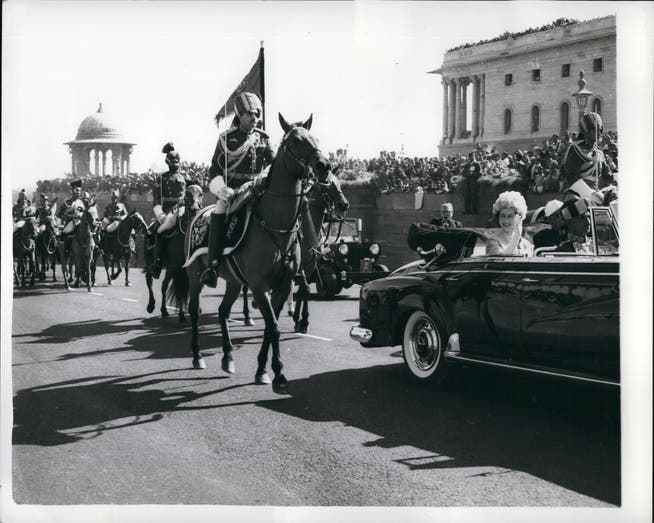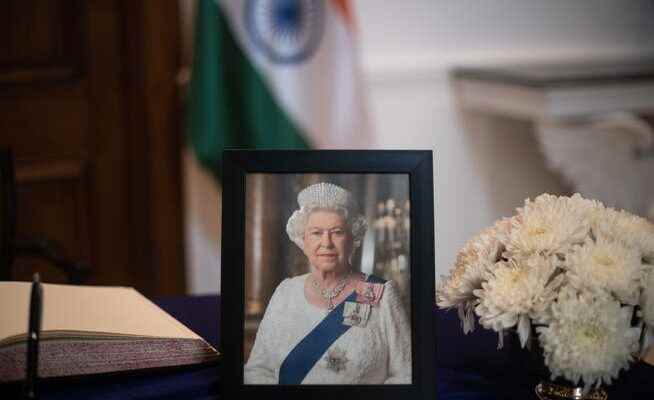India has officially declared national mourning after the Queen’s death. At the same time, people in the former British colony are wondering what happened to the Commonwealth under King Charles III. will happen.
A book of condolences is available at the residence of Britain’s official representative in India.
Sunday was an official day of mourning in India, proclaimed by Prime Minister Narendra Modi to commemorate the late Queen Elizabeth II. The Queen once showed him the handkerchief that Mahatma Gandhi gave her for her wedding, Modi wrote. He will never forget her warmth and kindness.
They were nice parting words from the Prime Minister. The flags hung at half-mast on Sunday. And the government buildings remained closed. Only: These would have been closed anyway, the employees were free anyway, it was Sunday. So the effects of national mourning on daily life remained small.
No apologies from the Queen
The relationship between India and the monarch has never been entirely unencumbered. This had less to do with the Queen herself than with Britain’s colonial heritage. The Queen was crowned in 1952, just five years after India’s independence.
In 1961 she visited the country for the first time. A television report from that time shows the Queen waving in open convertibles and thousands of Indians on the side of the road. For several weeks she visited steel mills, horse races, new office buildings and a nuclear reactor. The “New York Times” wrote at the time that the Queen’s visit was an opportunity for India to show that things were not going badly in their country since the British left. On her third and final visit to India in 1997, the Queen visited Jallianwala Bagh Park in the city of Amritsar. There, the royal soldiers had caused one of the biggest massacres in British history when they fired into the crowd during a protest until the ammunition was used up – around 1,500 people were killed.
The Queen should apologize for the massacre, but she did not make an actual apology: in history there are moments of sadness and moments of joy, she said. “We have to learn from the grief and build on the joy.”

Queen Elizabeth II was on her first state visit to India in 1961, pictured in Delhi.
The Queen did not interfere in South Asian politics. She did not attempt to mediate between the former colonies of Pakistan and India, although she was officially Queen of Pakistan when she began her tenure – Pakistan did not become a republic until 1956. After the British retreated, the Indian Empire broke up into India and Pakistan. The wounds of this division have not healed to this day. The neighbors have been fighting over the Kashmir region for decades, and today the two nuclear powers are engaged in a more or less open war.
The Commonwealth of Nations, an association of the former colonies of Great Britain and other countries, could have been a platform for mediation. Today the Commonwealth has 56 members, Togo and Gabon were the last countries to join, although both countries have no British colonial history.
India has been part of the Commonwealth since 1949, and then Prime Minister Jawaharlal Nehru joined, but only on the condition that he did not have to explicitly swear allegiance to the Queen. It is still unclear what happened to the Commonwealth under King Charles III. will continue. He will lead the platform in the future, that’s how the countries regulated it in 2018, the Queen had laid the successor on early. Analysts credit Elizabeth II with keeping the Commonwealth as a platform to this day – it was also a way for her to maintain international influence.
India could benefit from the Commonwealth
Indian politicians have repeatedly skipped Commonwealth meetings in recent years. That was a mistake, argues historian C.S.R. Murthy in an essay for the think tank Carnegie India. “The post-Brexit world presents an opportunity for India and Great Britain to rebuild the Commonwealth for mutual benefit,” he wrote back in 2018. The economies of both countries could have benefited from this, and the Commonwealth is also a good format for a counterweight to form China. For all of this to happen, Murthy said India would need to become more involved in the Commonwealth.
India’s Prime Minister Modi is a very active foreign policy maker. And India is the largest country in the Commonwealth, accounting for nearly two-thirds of the total population of all countries in that platform. The Indian voice has far more weight in the Commonwealth than, for example, at the UN.
Modi and then Prince Charles met for dinner in 2017. For two hours they talked about climate change, about sustainability – and about the Commonwealth. Charles later said he had told Modi that India’s contribution to the Commonwealth was “essential”.
